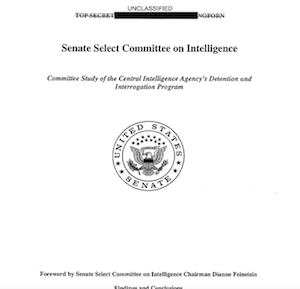WASHINGTON -- The CIA misled Congress and kept former President George W. Bush in the dark as it conducted interrogations of terror suspects that were far more brutal and less effective than publicly portrayed, according to a report by Democrats on the Senate Intelligence Committee.
RELATED ARTICLES
http://www.arkansas…">Report says CIA kept Bush in darkhttp://www.arkansas…">Hutchinson: '13 findings similarhttp://www.arkansas…">Report discredits CIA claim of torture leading to bin Laden
The harsh interrogations weren't effective and didn't produce key information that led to the killing of Osama bin Laden, the report said, contrary to claims by program supporters. Policymakers deceived by the CIA included Bush, who based a 2008 speech on inaccurate information that interrogations helped thwart terrorist plots, according to a summary of the 6,000-page report.
"Under any common meaning of the term, CIA detainees were tortured," said Sen. Dianne Feinstein, D-Calif., the panel's chairman., commanding the Senate floor for an extended accounting of the techniques identified in the investigation.
"History will judge us by our commitment to a just society governed by laws and the willingness to face an ugly truth and say, 'never again,'" she said.
At least 26 detainees didn't meet the standards for being held, according to the report. In the fall of 2002, a detainee died of hypothermia while shackled to a concrete floor. Another detainee was held for 17 days in the dark without anybody knowing he was there.
One detainee was left handcuffed by his wrists to an overhead bar for 22 hours over two consecutive days, the report said. At least five CIA detainees were subjected to what the report called "rectal rehydration" or rectal feeding without medical necessity.
The final report, which cost $40 million and took six years to complete, is the most comprehensive assessment of the CIA's so-called black-site detention facilities and "enhanced interrogation techniques" on at least 119 terrorism suspects after the terrorist attacks of Sept. 11, 2001.
The report said senior officials -- including former CIA directors George Tenet, Porter Goss and Michael Hayden -- repeatedly inflated the value of the program in secret briefings at the White House, on Capitol Hill, and in public speeches.
The report's release has renewed debate about the CIA program, which President Barack Obama ended when he took office in 2009. Obama said Tuesday that the contents of the report show that the enhanced interrogation techniques are counterproductive to larger national security goals.
He said the brutal treatment of detainees -- he did not directly call it torture -- wrought "significant damage to America's standing in the world."
"The report documents a troubling program," Obama said in a written statement. "It reinforces my long-held view that these harsh methods were not only inconsistent with our values as nation, they did not serve our broader counterterrorism efforts or our national security interests."
He went on to say that he supported releasing the declassified summary of the Senate report.
"No nation is perfect," he said. "But one of the strengths that makes America exceptional is our willingness to openly confront our past, face our imperfections, make changes and do better. Rather than another reason to refight old arguments, I hope that today's report can help us leave these techniques where they belong -- in the past."
CIA Director John Brennan said Tuesday that the program had "shortcomings" and that the agency made mistakes in the rush to gather intelligence after Sept. 11. But he disputed that interrogations didn't produce useful information or that the agency intentionally misled Congress or the White House.
The CIA's efforts "helped thwart attack plans, capture terrorists, and save lives," Brennan said in a statement. He said the report lacked "valuable context" because committee staff members didn't interview the CIA officers involved.
Varied techniques
Tuesday's report contradicted Brennan's statement, saying the most extreme interrogation methods played no role in disrupting terrorism plots or capturing terrorist leaders.
Contrary to claims by the agency, the brutal methods didn't lead U.S. officials to the identity of bin Laden's courier, the breakthrough that helped uncover the al-Qaida leader's location, according to the report.
The committee reviewed 20 of the most frequent and prominent examples of interrogation cases that the CIA claimed produced valuable information. None of the cases showed information was obtained that saved lives or that couldn't have been gleaned from other means, according to the findings.
Instead, the panel found that the CIA used interrogation techniques that differed significantly from those authorized by the Department of Justice and described to U.S. policymakers and lawmakers, according to the summary.
For example, the interrogation of terrorism suspect Abu Zubaydah, who was waterboarded at least 83 times, was more brutal than previously known. Waterboarding is a form of simulated drowning.
At one point, Zubaydah was put in a 1½ yard box and was rendered unconscious during a waterboarding session during which water and bubbles poured from his mouth, according to the summary.
The report also suggests that more prisoners were subjected to waterboarding than the three the CIA has acknowledged in the past.
Other tactics used against the detainees included slapping and slamming, and threats to kill, harm or sexually abuse their families. Some detainees with broken legs and feet were inappropriately forced to sit in stress positions, the report summary said.
Many of the detainees developed psychological problems.
The report also said the CIA's leadership for years gave false information about the total number of prisoners held, saying there had been 98 prisoners when CIA records showed 119 men were held.
Misleading and inaccurate information was provided to Bush that interrogations helped thwart terrorist plots, such as flying passenger planes into the Liberty Tower in Los Angeles and an airport and buildings in London, the report said. Bush used that information for a 2008 speech.
"The statement reflected inaccurate information provided by the CIA to the president and other policymakers in CIA briefings," the report states.
Bush and the full Senate intelligence committee weren't briefed on the techniques until 2006, according to the report. Some members, including Feinstein and Sen. John McCain, R-Ariz., raised objections. However, the CIA then informed the Justice Department's Office of Legal Counsel in a classified setting that no senators had objected.
The panel learned that former Vice President Dick Cheney was in meetings where the tactics were discussed.
Release blasted, praised
Democrats on the Senate intelligence committee released the findings Tuesday over the objections of some current and former U.S. officials, including Bush.
"I don't believe that any other nation would go to the lengths the United States does to bare its soul, admit mistakes when they are made and learn from those mistakes," Director of National Intelligence James Clapper said in a message to intelligence community workers. "Certainly, no one can imagine such an effort by any of the adversaries we face today."
Secretary of State John Kerry supported releasing the findings, State Department spokesman Jen Psaki said Monday. Kerry discussed the implications in a phone call with Feinstein and said it was up to her to decide when to release the data, Psaki said.
Republicans and former Bush administration officials who ran the program condemned the report in advance as a biased attempt to rewrite history. Others said releasing the findings would give terrorists fresh ammunition to escalate their violence and put the lives of additional U.S. officials and allies at risk.
"All they've got to do is find something they think indicates something, and they'll use it for their propaganda machine," Rep. Mike Rogers, R-Mich, said Monday. "Why are we going to risk the lives of some diplomat, for what?"
Senate Democrats fired back against such warnings.
"The implications of this report are profound -- not only is torture wrong, but it doesn't work," Senate Majority Leader Harry Reid, of Nevada, said on the Senate floor Tuesday. "The only way our country can put this episode in the past is to come to terms with what happened and commit to ensuring it will never happen again."
The eight Democratic members of the intelligence committee, as well as Michigan Democrat Carl Levin, an ex officio member as chairman of the Senate Armed Services Committee, wrote Clapper to "memorialize" what they said is his support for releasing the report in a phone call with them Friday, according to a U.S. official who's read the letter.
"There will never be an 'elegant' time to release this study, as it describes in stark detail the detention and interrogation actions of the CIA," the letter said, according to the U.S. official. "As such, you believe it is better to release the report now so that the intelligence community can begin to move past this chapter of its history."
Some Democrats and human-rights activists have hailed the report for finally exposing flaws and possible crimes in the CIA's rendition, detention and interrogation program, which largely operated from 2002 to 2005.
White House officials on Tuesday morning briefed former intelligence and counterterrorism officials who are prepared to defend the report's release on television and elsewhere.
U.S. officials also are bracing for international blowback that could fuel riots and retaliation in countries hostile to the U.S.
The Defense Department warned U.S. commands overseas on Thursday to take appropriate force protection measures in anticipation of the report's release, and the State Department and U.S. intelligence agencies have directed overseas posts and personnel to review and in some cases bolster their security.
Concerned about the political implications for allies that hosted the now-closed CIA secret prisons, Obama telephoned Prime Minister Ewa Kopacz of Poland on Monday to discuss the report and its possible ramifications. The European Court of Human Rights ruled in July that Poland had been complicit in the interrogation program and awarded hundreds of thousands of dollars in damages to two detainees said to have been kept there.
Announcing the report Tuesday, Feinstein acknowledged that there had been new pressure in recent days to withhold the report because of the possibility that it might provoke unrest.
"This clearly is a period of turmoil and instability in many parts of the world," Feinstein said. "Unfortunately, that is going to continue for the foreseeable future whether this report is released or not."
Top Republicans warned that Senate Democrats, and Feinstein in particular, would be responsible for any violent backlash.
"She will have to live with the consequences," said Sen. Richard M. Burr, R-N.C., who will be the chairman of the Intelligence Committee next year.
But McCain, who was tortured in Vietnam as a prisoner of war, was out of step with some fellow Republicans in welcoming the report and endorsing its findings.
"We gave up much in the expectation that torture would make us safer," he said in a Senate speech.
"Too much."
Information for this article was contributed by Chris Strohm and John Walcott of Bloomberg News; by Peter Baker, Carl Hulse, Mark Mazetti and Matt Apuzzo of The New York Times; and by Bradley Klapper, Ken Dilanian and Calvin Woodward of The Associated Press.
A Section on 12/10/2014


